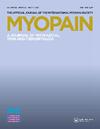Assessing the Perceptions of Fibromyalgia Syndrome in United States Among Academic Physicians and Medical Students: Where are We and Where are We Headed?
引用次数: 7
Abstract
Abstract Objectives: Fibromyalgia syndrome [FMS] is a common condition, often diagnosed in the primary care setting, causing diffuse pain with additional somatic symptoms. Many physicians have questioned the existence of FMS due to an unclear pathophysiological origin and its overlap with other somatic syndromes. We sought to assess the perceptions of FMS among United States medical students and internal medicine and family medicine trained physicians working in an academic hospital. Methods: Residents and attendings working in a local teaching hospital were given questionnaires during undergraduate medical education sessions and academic conferences in internal medicine and family medicine. Medical students received surveys during small group sessions and through student mailboxes. Results: Seventy-two internal and family medicine trained physicians and 211 medical students were surveyed. In assessing whether FMS was primarily physiological or psychological in origin, 66% of physicians compared to only 29% of medical students [p < 0.001] chose a psychological etiology. Among physicians, women [82%] and American medical graduates [77%] were more likely to endorse a psychological mechanism than their counterparts [53% p < 0.010, 50% p = 0.022, respectively]. Additionally, when physicians were asked whether they believed FMS was an “actual illness,” 19% responded “no.” Conclusions: Fibromyalgia syndrome continues to be a controversial illness in the United States, especially when compared with values attained from international studies. Although current academic physicians appear to be skeptical of FMS’s existence or its potential physiological mechanisms, medical students are more likely to support a physiological mechanism.评估美国学术医师和医学生对纤维肌痛综合征的认知:我们在哪里,我们将走向何方?
摘要目的:纤维肌痛综合征(FMS)是一种常见病,通常在初级保健机构诊断,引起弥漫性疼痛并伴有额外的躯体症状。由于不清楚FMS的病理生理起源及其与其他躯体综合征的重叠,许多医生质疑FMS的存在。我们试图评估美国医科学生和在学术医院工作的内科和家庭医学培训医生对FMS的看法。方法:对当地某教学医院住院医师和主治医师进行问卷调查,调查时间为本科医学教育和内科、家庭医学学术会议。医学生在小组会议期间和通过学生邮箱接受调查。结果:调查了72名内科及家庭医学专科医师和211名医学生。在评估FMS主要是生理原因还是心理原因时,66%的医生选择了心理原因,而只有29%的医学生选择了心理原因[p < 0.001]。在医生中,女性[82%]和美国医学毕业生[77%]比同行更倾向于支持心理机制[53% p < 0.010, 50% p = 0.022]。此外,当医生被问及他们是否认为FMS是一种“实际疾病”时,19%的人回答“不”。结论:纤维肌痛综合征在美国仍然是一个有争议的疾病,特别是当与国际研究的价值相比时。虽然目前的学术医生似乎对FMS的存在或其潜在的生理机制持怀疑态度,但医学生更有可能支持生理机制。
本文章由计算机程序翻译,如有差异,请以英文原文为准。
求助全文
约1分钟内获得全文
求助全文

 求助内容:
求助内容: 应助结果提醒方式:
应助结果提醒方式:


